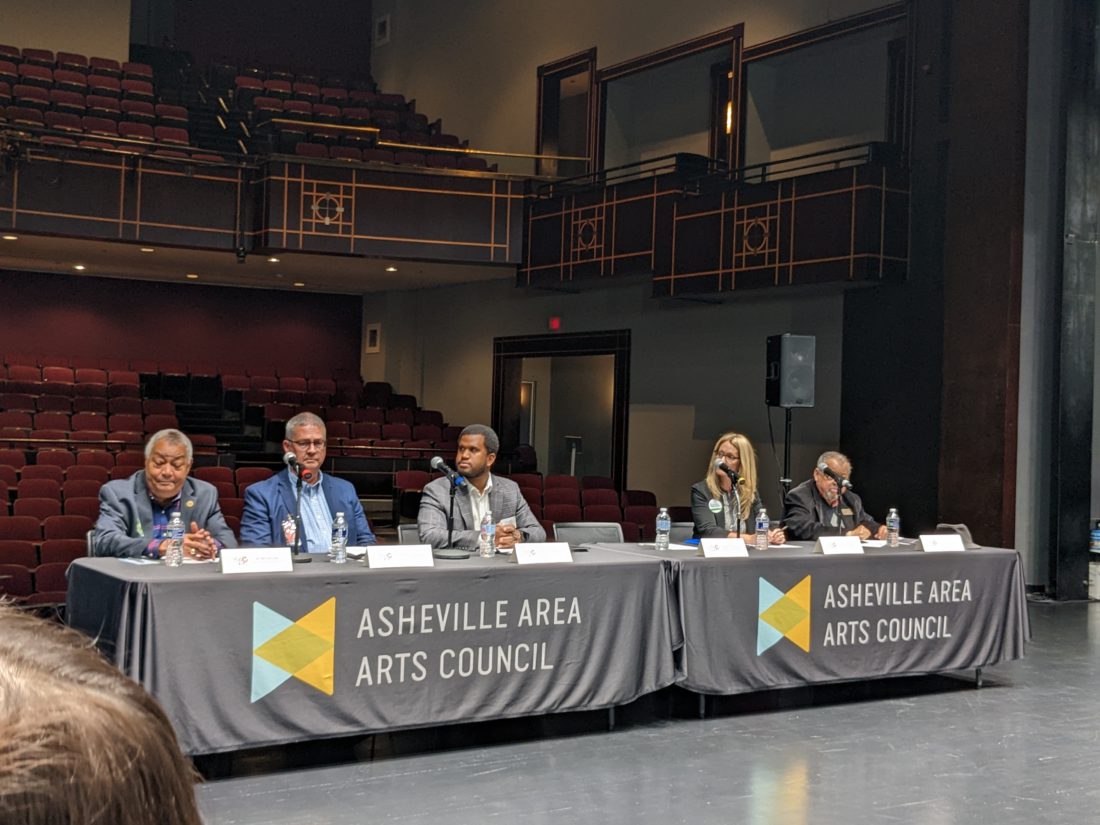“I was thinking — and that’s dangerous,” said Al Whitesides, roughly halfway through the Arts AVL Town Hall forum for Buncombe County commissioner candidates on Sept. 28.
The comment from the Democratic incumbent from District 1 drew scattered chuckles. The self-deprecating remark was one of the few engaging moments during an evening where many participants drifted off-topic. Instead of focusing on the arts-specific items raised by the event’s moderators, Asheville Area Arts Council Arts Coalition Chairs Stephanie Hickling Beckman and Liz Whalen Tallent, most of the speakers focused instead on countywide issues.
Other participants in the second of three candidate forums hosted by the AAAC included fellow incumbent Amanda Edwards (District 3, Democrat) and challengers Anthony Penland (District 1, Republican), Don Yelton (District 3, Republican) and Martin Moore (District 2, Democrat). Incumbent Robert Pressley (District 2, Republican) was scheduled to attend but was not present.
Though candidates spoke about affordable housing, arts and culture funding, the county occupancy tax and other matters, they primarily kept their comments broad regarding the local creative sector. During introductory remarks, Whitesides mentioned his wife Shirley Whitesides‘ former 35-year career as an Asheville City Schools art teacher, and Moore revealed that he played drums in numerous bands; but the other candidates’ experiences with the arts largely ceased after high school or freshman year of college.
In turn, few references were made to ongoing engagement with the county’s rich cultural offerings, and while all agreed that the arts community warrants funding, they differed on where the money should come from.
Asked what county government should do to address affordable housing for local creative workers, Penland turned the conversation into one of sufficient housing for all county residents. He then voiced his opposition to the housing bond referendum on the Nov. 8 ballot, citing the increased annual taxation it would place on area homeowners. (If passed, the bond will cost residents roughly $32 more in property taxes for a home valued at $200,000 and $64 for one valued at $400,000.)
“At the current pricing [and] the way things are going in this county and this country, is it the right time to be doing it?” Penland said. He went on to argue that in attempting to address affordability issues, the bonds would make things “less affordable.”
Despite a block grant of nearly $130,000 that commissioners approved in the 2022-23 budget for the AAAC, Buncombe County still lags behind fellow tier 3 North Carolina counties when it comes to local government support for the arts. Moore said, if elected, he would favor increasing funds for the local creative sector.
“This has a positive impact on everyone, and I think we need to continue to invest in things that work,” he said.
Yelton noted that an additional $100,000 annually would get the county above the tier 3 average. But going forward, he proposed a different plan to help cover the costs.
“We are bringing lots of people to Asheville who’ve got lots of money,” he said. “What if we tax the sale of art and let it go straight to the [Arts Council]? Nobody touches it. It doesn’t go to Raleigh. … It doesn’t go to the county. … It goes straight to you guys, in the arts.”
Another question concerned whether cultural infrastructure should be addressed in the Buncombe County Comprehensive Plan and if a countywide cultural plan would help foster more inclusive access to the arts for all county residents.
In response, Edwards applauded the collaboration of the AAAC and fellow nonprofits Thrive Asheville and Asheville GreenWorks in creating a natural and cultural asset inventory that’s scheduled for completion in late spring 2023. Edwards noted its potential positive impact on low-income residents.
“One of the things that’s really important to me as we think about cultural equity in the arts is [that] a lot of times folks in underresourced communities don’t come to the arts,” she said. “How do we ensure equity [so] that everyone has access? And how do we take the arts and creative sector to our folks where they are?”
Yelton then asked for a show of hands regarding how many attendees had been contacted for input on the Comprehensive Plan, which focuses on the next 20-year period, looking at the relationships involving land uses, infrastructure and key community services and amenities. When only AAAC Executive Director Katie Cornell answered in the affirmative, Yelton said the plan couldn’t be called “comprehensive” since input from every Buncombe County citizen hadn’t been sought. Whitesides responded that over 3,000 residents have given feedback in public meetings that have been held on the plan and that more would be heard at upcoming events.
“We’ve got to include everybody in everything that we do, and if we’re not doing that, we’re not being responsible in doing our jobs as commissioners,” Whitesides said. “The arts community is not on an island by [itself]. You’re a big part of our community, and we’ve got to make sure that you are included — and that’s what we’re trying to do.”
The Arts AVL Town series concludes Wednesday, Oct. 12, with Asheville mayor and City Council candidates. The event is free to attend, but registration is required. To learn more, visit avl.mx/af1.



Before you comment
The comments section is here to provide a platform for civil dialogue on the issues we face together as a local community. Xpress is committed to offering this platform for all voices, but when the tone of the discussion gets nasty or strays off topic, we believe many people choose not to participate. Xpress editors are determined to moderate comments to ensure a constructive interchange is maintained. All comments judged not to be in keeping with the spirit of civil discourse will be removed and repeat violators will be banned. See here for our terms of service. Thank you for being part of this effort to promote respectful discussion.